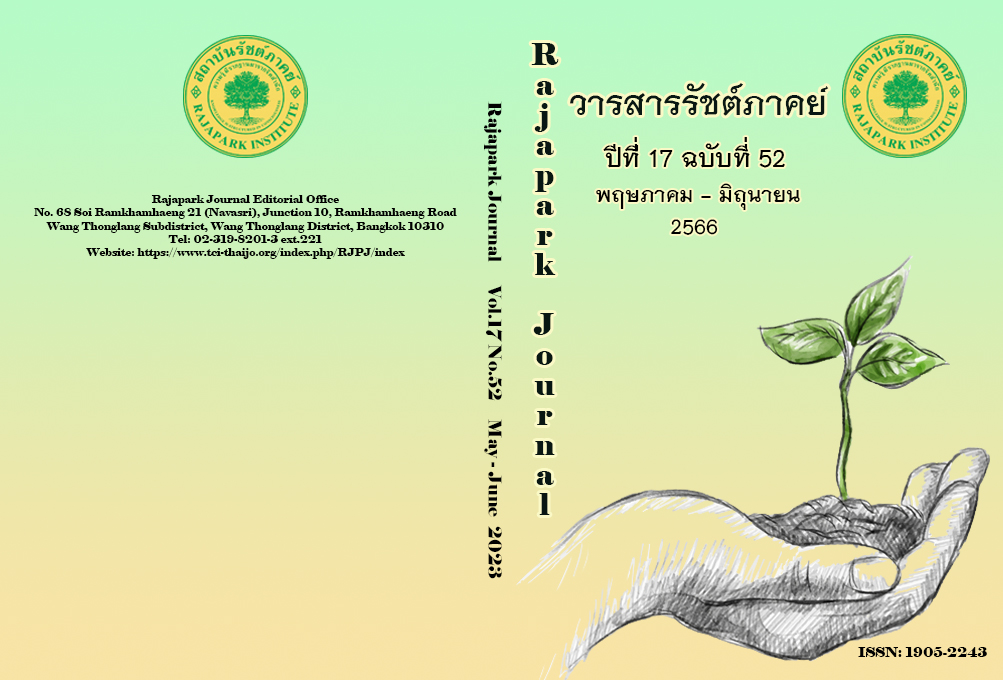The Competencies Standard of Human Resources Affecting Competitiveness in Concert Business
Main Article Content
Abstract
The purposes of this study are 1) to study the demographic characteristics of managing executives in concert organizer businesses, 2) to find out the standard competencies of human resources that affect the competitiveness of concert businesses, and 3) to investigate the perspectives of public and private sector executives toward the competitiveness of the concert business. This study employed a mixed-methods approach. The questionnaire was used to collect quantitative data. Purposive sampling was used to select 30 executives from the concert industry for this study. The data was analyzed by applying descriptive statistics, percentages, averages, and standard deviations. The findings of the first study were presented in tables with details. Qualitative method was employed with the structured interview to collect data from eight to twelve executives in the public and private sectors of the event industry and concert business from the Bangkok metropolitan area. Content based analysis was used for this data. The results found that the significant competencies of human resources in the field comprise of eight components (i.e., personal competency, specific competency, organizational competency, core competency, work competency, management competency, leader competency, and business competency). Competencies of human resources affecting competitiveness at the organizational level included basic knowledge of MICE and event industries, online and offline concerts, concert management skills, communication skills, coordination skills, teamwork, responsibility, working under pressure, and working with no time limitation. While competencies affecting competitiveness at personal level in the organization contain operational knowledge of specific positions, professional management skills, creativity, emotional intelligence, and technology skills. Responsibility characteristics, and special competencies are also key attributes to encourage individuals to perform their roles outstandingly.
Article Details

This work is licensed under a Creative Commons Attribution-NonCommercial-NoDerivatives 4.0 International License.
Views and opinions appearing in the Journal it is the responsibility of the author of the article, and does not constitute the view and responsibility of the editorial team.
References
Akaraborworn, C. (2006). Create People, Create Works. Taoism Publishing House (2000).
Akaraborworn, C., & Koonmee, K. (2004). The Project to Build a Human Resource Development System with Capacity Skills. National Institute of Development Administration.
Boyatzis, R.E. (1982). The Competent Manager: A Model for Effective Performance. John Wiley and Sons.
Blancero, D., Boroski, J., & Dyer, L. (1996). Key Competencies for a Transformed Human Resource Organization: Results of a Field Study. Human Resource Management, 35(3), 383-403.
Bellanca, J., & Brandt, R. (Eds), (2010). 21st Century Skills: Rethinking How Students Learn. Solution Tree.
BrandBuffet. (2022, July 7). Update the Event Industry. https://www.brandbuffet.in.th/2022/07/index-creative-village-transforming-new-business-real-and-digital-experience/
Fletcher, D., Dunn, J., & Prince, R. (2009). Entry Level Skills for the Event Management Profession: Implications for Curriculum Development. Journal of Research, 4(1), 52-57.
Institute of Professional Qualifications (Public Organization) and Burapha University. (2020). Occupational Standards and Professional Qualifications: MICE. https://www.micecapabilities.com/mice/uploads/attachments/TPQI_MICE.pdf
Kanjanapokin, K. (2018, June 21). The Formula for Successful Events in the Social Media Age is not Enough Creative & Innovation, Must Create a “Snap-Share”. BrandBuffet. https://www.brandbuffet.in.th/2018/06/index-creative-village-creative-innovation-and-social-media-share/
Kansamut, N., Jaroenwisan, K., & Phuripakdee, S. (2020). Human Resource Development to Enhance Competitiveness of the MICE Industry in Songkhla. RMUTSV Research Journal, 12(1), 120-132. https://li01.tci-thaijo.org/index.php/rmutsvrj/article/view/242046
Kay, K. (2010). Foreword, 21st Century Skills: Why They Matter, What They Are, and How We Get There. In Bellanca, J. & Brandt, R. (Eds.), 21st Century Skills: Rethinking How Students Learn. Solution Tree.
Likert, R. (1970). New Patterns of Management. McGraw-Hill.
Limpanawetsakul, P., & Chuntuk, T. (2016). Human Resource Development in Exhibitions. Veridian E-Journal, Silpakorn University (Humanities, Social Sciences, and Arts), 9(1), 1327-1335.
McClelland, D.C. (1973). Testing for Competence Rather Than for Intelligence. American Psychologist. 28, 1–14.
McLagan, P.A. (1997). Competencies: The Next Generation. Training and Development 51, 40-47.
Nadler, L. (1980). Corporate Human Resource Development: A Management Tool. Van Nostrand Reinhold Company.
Nudee, P. (2015). Effects of Organizer Entrepreneurs Characteristics towards the Business Performance in MICE Industry, Songkhla Province[Master’s thesis, Prince of Songkla University].
Prachachat Business Online. (2021, Oct. 26). “Event” will definitely come back …but probably not the same. https://www.prachachat.net/marketing/news-787147.
Prahalad, C.K., & Hamel, G. (1994). Competing for The Future. Harvard Business School Press.
Prompan, S. (2011). Dissection of Competency for Development of Competency. Panyachon.
Saenthong, N. (2004). Let’s get to know Competency. HR Center.
Sattachatmongkol, N. (2018). Human Capital Development Guidelines for Operational Personnel in MICE Industry[Doctoral Dissertation, Silpakorn University].
Smithikrai, S. (2013). Recruitment, Selection and Performance Evaluation of Personnel (4th ed.). V. Print (1991).
Spencer, L.M., & Spencer, S.M. (1993). Competence at work: Model for superior performance. Wiley.
Thailand Convention & Exhibition Bureau (TCEB). (2022). Operational Plan and Budget 2022. https://www.businesseventsthailand.com/uploads/image_file/file/220420-file-GBDwh2mDp.pdf
Thongkaew, T. (2002). Leadership: Core Competencies of Executives in the Reform Era. Academic, 5(9), 35-43.
Tienput, D. (1997). Strategies for Human Development (2nd ed.). Book Bank.
Wongthaweerat, P. (2016). Policies for Competency Development for Event Management Executives. Academic Journal Phranakhon Rajabhat University, 6(2), 187-199. https://so01.tci-thaijo.org/index.php/AJPU/article/view/54728


